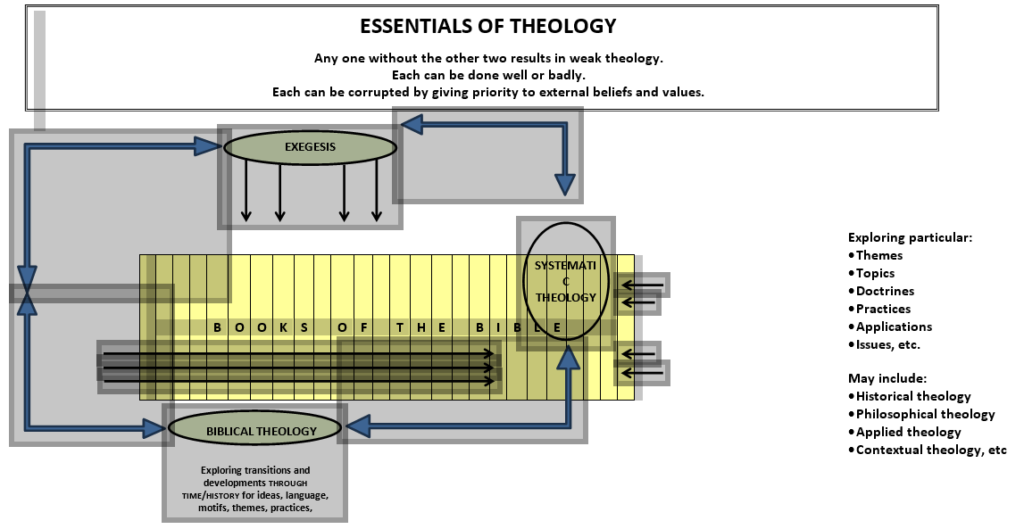Like me, I am sure you have a preferred approach to preaching. Is it expository or thematic or something else??
Most approaches have good arguments supporting them which is why the debates arguing for one being better than the others never seem to reach a conclusion.[1]
In your International Church (IC) there are people with a variety of experience of preachers and sermons, and many of them also have a preference. This might be true of all churches but in the IC it is much greater due to the huge mix of nationalities and church backgrounds. Perhaps this is a reason for the IC preacher to mix it up a bit!Perhaps utilize different approaches as this potentially better helps the people to listen and learn. A monochrome approach in an IC seems to contradict the diversified character of the IC community.
But there is a far greater reason for mixing it up.
Here are three basic approaches to preaching from the Scriptures. These are represented in the diagram at the end.Any one without the other two results in weak theology. Each can be done well or badly: so, it is not helpful to compare a bad use of one with a good use of another to justify one’s preference! Each can be corrupted by giving priority to external beliefs and values from tradition, denominational dogma, culture, philosophy, world view, or personal preference.
Why claim that all three are essential if there is to be strong rather than weak theology? Simply because each on its own can never encompass the whole theological richness of the Bible. Each draws out particular theological perspectives but only when all is put together is the Bible adequately understood theologically. All three are needed for missional thinking and practice though the third has greater potential to motivate and inform mission.
If you desire your IC to mature theologically and to engage missionally, I urge you to include all three in your preaching schedule. In every IC, there will be people strong and/or weak in all these approaches.
In the following I will over-simply somewhat for the purposes of clarity. There are many variations on each of these three and most of us tend to include a little of each in our sermons even while we utilize just one. I have used three headings for these but headings such as these risk misunderstanding as there are various views on what they might mean!
Expository Preaching one book or passage at a time.
This is the essential work of engaging diligently with the text of Scripture. All theological learning requires serious exegesis. It may be just a one-off sermon on a particular passage or a series that works through a whole book.
It may be verse by verse, or structured around the main themes in the passage, or structured around the flow of ideas in the passage.
All congregations need to experience, and learn from, preaching that engages with the text in this way. Good expository sermons teach congregations by example how to discern the meanings within the passage. They don’t just give people conclusions from the passage but show how the passage works to present such a conclusion. They teach people how to do exegesis and thereby the people are empowered.
The text sets the agenda and determines the content, and so reduces the risk of sermonizing only what appeals to the preacher.But note, this is not the traditional practice of having a text to introduce the sermon (usually just a verse or two) and then using this as a launching pad for whatever the preacher wants to say about anything at all!![2] Never assume that because it is text-based that expository preaching is less risk prone. Inadequate preparation, the lack of awareness of context, and the imposition of questionable evangelical culture, has too often produced sermons that lose much of the original message of the text. It is quite easy to slip blindly into exegesis.
Expository preaching should in time cover the full range of genres in the Bible: may be narrative, poetry, history, prophetic proclamation, didactic explanation, parable, apocalyptic, or whatever. Each genre brings a different perspective on the character, power, mind and purposes of God.All genres are needed. The challenge for every preacher is to commit sometimes to a genre that for him or her has a greater level of difficulty!
Ultimately, all good preaching has an element of expository work within it. Thematic sermons must engage with the text but usually this is a collection of short encounters with several texts in one sermon.
But expository preaching can never adequately address a full understanding of many essential topics and themes. No one passage of scripture covers all that the Bible says on a topic. Attempting to use one text for such themes seriously risks a proof-texting approach. Sooner or later all churches need to learn about a large number of themes in some depth. True, expository preaching sooner or later will cover much of the material on a particular theme, but without a serious examination of how all the material fits together, there will be more of a bits and pieces, and less integrated, understanding. So we move on to the next approach.
Thematic Preaching – Systematic Theology.
Systematic Theology is what it says, the organizing,or systematizing, of Biblical material into a number of areas and then exploring what all the relevant material has to say. In this way, good understanding can be developed of particular themes, topics, doctrines, ethical questions, practical concerns, missional challenges, applications, and contemporary issues.Focusing in on item at a time allows for greater precision in understanding, which better protects against error, and identifying the language that best expresses the ideas and concepts. The essential work of exploring theological context, and the impact of culture, is better handled in this way. In more professional theological circles, historical and philosophical theology may be included.
The risk in all thematic preaching is too much of a fly-over approach to the text of Scripture. With the larger topics, this may be somewhat inevitable. Perhaps trying to cover it in one sermon is too much and a series would be more helpful. Furthermore, there is the risk that the preacher gravitates mostly to the topics that are most familiar or preferred for some reason. But there are ways to counter this tendency such as wide reading and much listening to people within the church and beyond.
It is true that thematic sermons require much more preparatory work; there is just so much more to include. This is unavoidable. Too often, not all the relevant material has been included in the preacher’s preparation and so the sermon ends up with a distorted understanding of Scripture. There is an art to collecting together and collating the Biblical material on a sizeable topic; it is worth the effort to develop this art.
Thematic preaching at its best teaches by example how to put together the wealth of Biblical input on a subject into a cohesive theological conclusion.
It needs to be recognized that traditional Systematic Theology can easily neglect many of the issues facing Christians today because it is based on logical structures of thought that are somewhat culturally constructed out of earlier periods of history. This does not make traditional Systematic Theology bad or without great value; it means that the thematic preacher needs to be aware of its limits.
Examples:
- Any of the standard doctrines addressed in Systematic Theology.
- God’s passion for social justice.
- God’s passion for the lost.
- The importance of the mind for Christian discipleship.
- The various aspects of prayer.
- The mix of individual and corporate/collective experiences of God’s work.
- Theology of politics (because there is so much more to this than just Romans 13).
- Any of the major issues currently dominating the media.
- What is the Gospel: The Lordship of Jesus, the Kingdom He is working on, and the salvation it brings.
It is in the nature of thematic preaching to identify the timeless truths of the Scriptures. And of course, to apply them. It tends to look back to the past for figuring out how to live in the present. It inclines towards a more static, support the status quo, and conservative perspective on life. It tends towards a suspicion of change with a consequent resistance to reform. So our next approach is vital.
Narrative Preaching – Biblical Theology.[3]
Biblical Theology is a method of study that is chronological in character. Narrative is at the heart of its structure but not the narrative of a particular passage or story but the narrative of the whole of Scripture from Genesis to Revelation, from creation to new creation, from promise to fulfilment. It is the story of transition through history from the integration of all things in Genesis 1-2, to the disintegration of all things with the introduction of human sin, to the reintegration/reconciliation of all things in new heaven/earth.
Narrative preaching follows this chronology in exploring transitions and developments through time/history for ideas, language, motifs, themes, practices, promises, etc. For any specific idea, how does it develop through time, what stays the same and what changes, how does it reach a conclusion or fulfillment in the Kingdom of God?
Biblical Theology articulates the missional work of God through human history. A missional mind-set is best developed with this approach because our mission is a participation in the story of God’s mission through history and into the future. Narrative preaching at its best leaves listeners with a stronger sense of God on the move, God active and engaged, God pushing forward into the future. Such preaching generates a sense of movement, change, reform, transition. It encourages a stronger awareness of hope and a future. It has a radical edge that disturbs the status quo.
Eugene Peterson writes about “Living into God’s Story”[4] while Gabriel Fackre states, “Narrative speaks in the idiom of the earth.”[5]Alister McGrath in support of Narrative Theology states that it avoids “the dulling sense of abstraction” and appeals “to the imagination” (2001:169).[6]
Such a big-picture narrative, theology expressed narratively, better enables Christians to relate to and personally apply such theology as they see how their own personal story meshes with the story of God’s engagement with the world in which they live: better able to recognize the connection between their own personal experience and the developing work of God in their world. Story is much less abstract than the systematic logical formulations of ideas. Systematic s is equally essential in the life of the church. Some doctrines are more helpfully expressed systematically and others narratively. Eschatology, the Kingdom of God, and mission are all unfolding realities for which narrative better enables people to see how their lives fit within the larger story of the work of God.
Examples (all can be done simply in one sermon or built up through a sermon series):
- The presence of God from Eden, to the tabernacle and temple, to Jesus, to the Holy Spirit, to Revelation 21-22.
- God’s purposes for the nations from Genesis 1 to Revelation 21:24-26.
- The OT hope of the Kingdom of God, to its already but not yet fulfillment in Jesus first advent, to its completion in the summing up of all things in heaven and earth in Christ when heaven and earth become one in Revelation 21-22.
- The story of grace and faith from Genesis onwards.
- How God’s passion for justice, or holiness, or love, or grace, or peace, flows through the whole narrative.
- The movement or journey from Garden (Genesis 1-2) to Garden City (Revelation 21-22).
- The call to love and include the stranger, alienated, refugee, homeless, marginalized, as God loves all such people.
- The work of the Holy Spirit from Genesis to Revelation to renew the earth (Psalm 104:30) and to sanctify God’s people.
A simple sermon structure for such preaching follows the basic divisions of Biblical history from Genesis 1-2 to Revelation 21-22. It can be a four-part sermon (Genesis 1-2, the Old Testament, New Testament, Revelation 21-22) or the Old Testament can be expanded into Law, Psalms, Prophets and the New expanded into Gospels, Acts, Letters. It just depends on how simple or complex you want the sermon, or sermon series, to be. The important thing is to help people see how God is at work throughout all human history towards the future He is committed to.
If thematic preaching is demanding in preparation, narrative preaching is even more so – especially for those who have not yet explored Scripture in this way so much. But putting it aside and into the too-hard-basket simply disadvantages a church. It misses out on a critically important perspective on Scripture and the mission of God.
We need more attention to this as it is less common and yet greatly needed.
Theology that resonates with mission practitioners is that which takes seriously the presuppositions from which they work, which connects their own work and story with the larger narrative of God’s work, and which is comprehensive rather than just a piece of the puzzle. Richard Bauckham discusses the value of a “narrative hermeneutic” for mission.[7]“Central to this interest in narrative among practical theologians is the recognition that human beings interpret and make sense of their world through a story. That is to speak of story, not in literary categories, but as the essential shape of a worldview.”[8] Christopher Wright argues that mission is an engagement with the story of what God is working out from creation to new creation, from Genesis to Revelation. As “We live in a storied universe” (2004b:126) so the story of the missio Dei is the essence of all mission.[9]
Narrative theology integrates well with mission theology as both engage with human experience through time.Biblical Theology brings perspective on what God is doing about the issues on the minds of people. So many people are longing for a better world, each with their priorities as to what is needed most. The story of the Kingdom is the story of what God in Christ is doing about all of these. This is a narrative of theological substance which makes hope real. And “Hope is a good thing, maybe the best of things. And no good thing ever dies.”[10]
A passion for ICs to increasingly be missional in character and practice leads to the need for a theology of change and transition, of movement through human history, of direction and purpose, of vision and the future. The narrative of the Kingdom gives shape to our mission so that by word and deed our engagement with the world lines up with the missio Dei. If systematic theology tends more towards a conservative mind-set, Biblical theology tends more towards a radical mindset. Both have their place.
The International Church: Missionally engaged, theologically maturing.
The missional opportunities for ICs are an amazing range of possibilities. IC preachers are key to mobilizing the church to be a sent people in word and deed. In recognition of this, IC preachers must sustain a passion for increasing the theological maturity of the church, collectively and individually.
There are further requirements for learning the full theological depth of the Scriptures. Praying for the Spirit’s enlightenment is vital. But be careful, the Spirit is most unlikely to reveal to you what He does not reveal to others! The best of theological learning with the Spirit’s enlightenment is a corporate experience, preferably across cultures and traditions.
The best preaching leaves people with unanswered questions. Preaching should stimulate further reflection. This can be overdone of course but the love of learning from Scripture, and its application to life, is inspired when there is mystery, and questions to ponder.
Theological maturity requires engagement in mission and reflection. Every conversation, every walk through the mountains or along the beach, every news item, every experience of loving and serving others, every work or home involvement, every participation in worthy causes, every stand for justice, every challenge in the political arena, every travel experience whether to the local market or on an international flight; all are opportunities for theological reflection. All should help us mature theologically through the grounding of Biblical truth with everyday realities. In other words, stay in your small world and theological depth will elude you!
Theology matters. Everything relies on theological depth including wise and effective mission engagement. And yet we are still on the journey towards such depth. As you map out your preaching schedule for your IC, how will you ensure all three of these preaching approaches are included?
Graham Chipps

[1]It is not hard to track down these arguments. There are more substantial explanations of each than is provided here.
[2]My friend once heard a sermon that began with a short text and then concluded with a call to “Rebuild the British Empire!”
[3]If Biblical Theology as a method of study is new to you, check out Alexander, T Desmond & Rosner, Brian S (Eds), 2000: New Dictionary of Biblical Theology, Leicester: IVP. The difference between good Systematic Theology and good Biblical Theology is one of method. Both should be thoroughly Biblical. See also Lawrence, Michael, 2010. Biblical Theology in the Life of the Church: A Guide for Ministry. Wheaton, IL: Crossway.
[4]2013: ‘Living Into God’s Story.’ http://www.biblicaltheology.ca/blue_files/Living%20into%20God’s%20Story.pdf
[5]1983: ‘Narrative Theology: An Overview.’ Interpretation, 37/4:340-352. p. 345.
[6]2001: Christian Theology: An Introduction (Third Edition), Oxford: Blackwell. p. 169.
[7]2003: Bible and Mission: Christian Witness in a Postmodern World, Carlisle: Paternoster. pp. 12-26.
[8]Bartholomew, Craig G & Goheen, Michael W, 2004: ‘Story and Biblical Theology.’ In Bartholomew, Craig; Healy, Mary; Möller, Karl; Parry, Robin (Eds), Out of Egypt: Biblical Theology and Biblical Interpretation, Milton Keynes: Paternoster. 144-171. p. 147.
[9]2004: ‘Mission as a Matrix for Hermeneutics and Biblical Theology.’ Bartholomew, Craig; Healy, Mary; Möller, Karl; Parry, Robin (Eds), Out of Egypt: Biblical Theology and Biblical Interpretation, Milton Keynes: Paternoster. 102-143. p. 126.
[10]“The Shawshank Redemption.”



